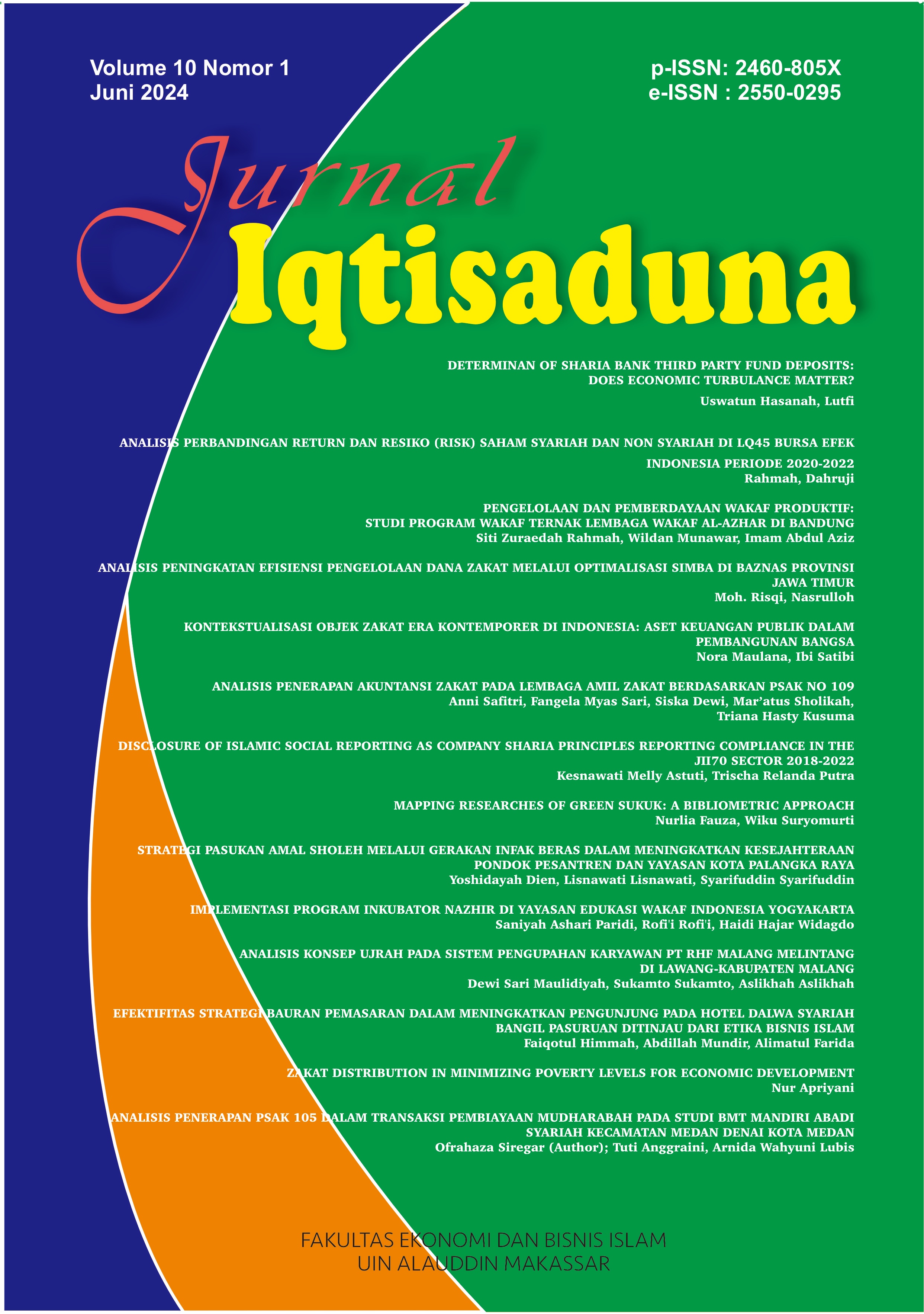Zakat Distribution in Minimizing Poverty Levels For Economic Development
Abstract
Poverty is one of the significant societal challenges in many countries. The government and social organizations have tried to reduce poverty through various programs and policies. One instrument recognized as having the potential to reduce poverty is zakat, a social obligation for Muslims to give a portion of their wealth to those who deserve it. The purpose of this study is to analyze the role of zakat in minimizing poverty. Zakat has great potential to help reduce poverty in Indonesia. Evaluate the effectiveness of zakat distribution by assessing the extent to which zakat has been effectively distributed to those entitled to receive it. Many zakat programs implemented have directly assisted individuals and families in need. As well as measuring the impact of zakat on the economic empowerment of zakat recipients. This can involve analyzing economic growth, creating jobs, and improving the economic welfare of zakat recipients. Zakat has also been used to develop program skills and training, positively impacting Zakat recipients' social and economic mobility. However, this study also identifies several challenges that must be overcome in implementing zakat to minimize poverty. Some of these include the need for more awareness about zakat and its distribution mechanisms, uneven distribution, and governance problems within zakat institutions.
Downloads
References
Al Arif, M. Nur Rianto. (2010). Teori Makroekonomi Islam Konsep, Teori dan Analisis,. Bandung, Alfabeta
Basuki, A. T. (2019). Regression Analysis in Economic and Business Research (3rd ed., p. 364). Eagle Press.
Bawono, A. &, &; Shina, A. F. I. (2018). Econometrics Applied to Islamic Economics and Business with Eviews Application. Salatiga: LP2M IAIN Salatiga.
Dafa, B., & Hidayat. (2022). IMPLIKASI ZAKAT TERHADAP PEREKONOMIAN. Jurnal Ekonomi Syariah Pelita Bangsa, 07(02), 125–137.
El-Madani; (n.d.). Fiqh zakat lengkap (Ahmad Saifudin, Ed.; cet 1). Yogyakarta: Safirah, 2013.
El-Madani. (2013). Fiqh zakat lengkap. Diva Press.
Gus Arifin. (2011). ZAKAT, INFAK, SEDEKAH: DALIL-DALIL DAN KEUTAMAAN. Elex Media Komputindo.
H. Ahmad Rofiq. (2012). Fiqh Kontekstual Dari Normatif Ke Pemaknaan Sosial (cet. II). Pustaka Pelajar.
Ibn Khaldun Bogor, U. (2019). LEMBAGA ZAKAT DAN PERANANNYA DALAM EKUITAS EKONOMI SOSIAL DAN DISTRIBUSI. Al-Infaq: Jurnal Ekonomi Islam, 10(1), 13–27. https://jurnalfai-uikabogor.org/index.php/alinfaq/article/view/527
Ibrahim Mustafa. (2015). Mu`jam al-wasith. Maktabah al-`Ilmiyyah.
Islamic Economics: theory and its application to economic activity / Dr. Rozalinda, M.Ag. | OPAC National Library of Indonesia. (n.d.). Retrieved December 27, 2022, from https://opac.perpusnas.go.id/DetailOpac.aspx?id=892458#
Islamic economics: theory and its application to economic activity / Dr. Rozalinda, M.Ag. | MUHAMMADIYAH MAKASSAR UNIVERSITY LIBRARY. (n.d.). Retrieved December 27, 2022, from https://library.unismuh.ac.id/opac/detail-opac?id=103255
Ivan Rahmad Santoso. (2016). Manajemen Pengelola Zakat. Ideas Publishing.
Nawawi, Ismail. 2010. Zakat in Fiqh, Social &; Economic Perspective, Putra Media Nusantara: Surabaya
Nurbismi. (2019). Peranan Kinerja Amil Mengelola Zakat Produktif dalamMengentaskan Kemiskinan Di Kota Banda Aceh. JURNAL SAMUDRAEKONOMI DAN BISNIS, VOL 10, NO.
Pedoman Zakat. (n.d.). Perpustakaan Daerah Kabupaten Tasikmalaya. Retrieved December 29, 2022, from http://perpus.tasikmalayakab.go.id/opac/detail-opac?id=1101
Purwanti, D. (2020). The Influence of Zakat, Infak, and Alms on Indonesia's Economic Growth. Scientific Journal of Islamic Economics, 6(01), 101–107
Qadir, A. 1998. Zakat in Mahdah and Social Dimensions. Jakarta: Rajasdo Persada.
Razak, Nasruddin. 1996. Dienul Islam, Al Ma'arif Bandung
Rozalinda. (2014). Ekonomi islam : teori dan aplikasinya pada aktivitas ekonomi. https://library.unismuh.ac.id/opac/detail-opac?id=103255
Saifuddin, Optimization of Zakat Fund Distribution: Wealth Distribution Efforts (Study of Law No. 23 of 2011 concerning Zakat Management), Az Zarqa', Vol. 5, No. 2, December 2013
Saprinal, Manurung, IslamicReligiosityandDecelopmentofZakatInstitution, Qudus International Journal Of Islamic Studies, Volume 1 | Number 2 | July-December 2013
Sugiyono. (2015). Memahami penelitian kualitatif (sugiyono, Ed.; 10th ed.). Alfabeta,
Syariah, J. E., Bangsa, P., Dafa, B., Hidayat, I. T., & Rohim, A. N. (2022). Implikasi Zakat Terhadap Perekonomian. Jurnal Ekonomi Syariah Pelita Bangsa, 7(02), 125–137. https://doi.org/10.37366/JESPB.V7I02.567
Wahbah Al-Zuhayly. (1995). Zakat : kajian berbagai mazhab (cei. 1).
Zakat Guidelines | Regional Library of Tasikmalaya Regency. (n.d.). Retrieved December 29, 2022, from http://perpus.tasikmalayakab.go.id/opac/detail-opac?id=1101
Zuhri, S. (2012). Zakat di Era Reformasi (Tata Kelola Baru) Undang-Undang Pengelolaan Zakat No. 23 Tahun 2011. Semarang: Bima Sejati.

